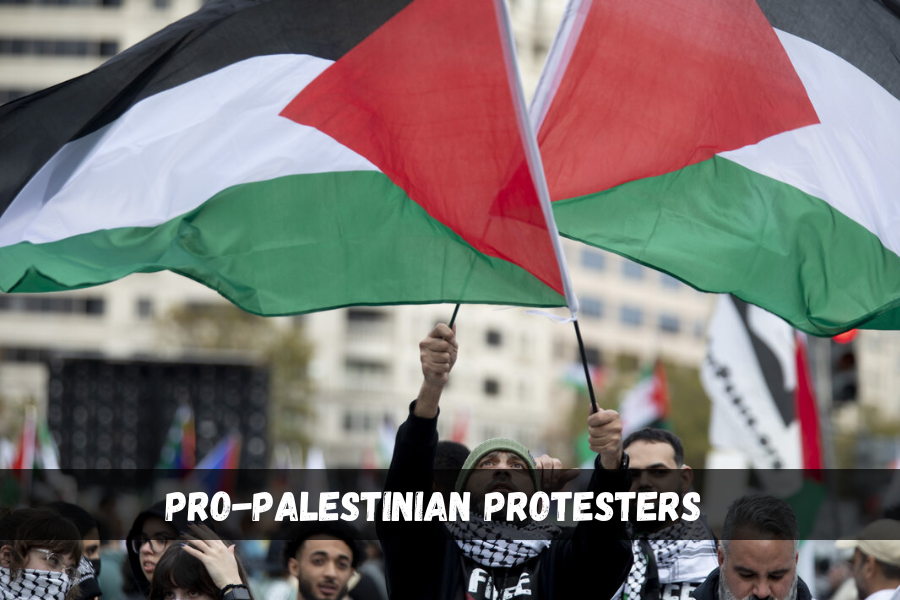Pro-Palestinian protests have emerged as a significant and continuous global movement, drawing attention to the ongoing suffering of Palestinians and their long-standing fight for self-determination, justice, and peace. These demonstrations are a direct response to the decades-long Israeli-Palestinian conflict, with protests taking place in various forms—from peaceful rallies and marches to acts of civil disobedience. Despite the diversity in the methods and scope, the core message of these protests remains clear: solidarity with Palestinians, raising awareness about their struggles, and calling for an end to the Israeli occupation of Palestinian territories.
The intensity of pro-Palestinian protests has escalated over recent years, especially during periods of heightened violence between Israel and Palestinian groups such as Hamas. These protests have become increasingly global, attracting support from people of various backgrounds, political ideologies, and regions. From Europe to North America and beyond, the voice of pro-Palestinian activists continues to grow, demanding a peaceful resolution to one of the most entrenched conflicts in modern history.
Also Learn More: The Guilded Age Filming Schenectady Dates: Exploring the Impact and Behind-the-Scenes Details
The International Reach of Pro-Palestinian Movements
Pro-Palestinian protests are not confined to the Middle East. In fact, they have become a worldwide phenomenon, appearing across many countries. These protests have gained traction in regions with large Arab or Muslim populations but have also attracted widespread participation from human rights organizations, progressive activists, and even non-Muslim communities. The motivations driving these movements may vary, but a shared desire to address the Palestinian issue remains the common thread.
United States
In the United States, pro-Palestinian demonstrations have become increasingly prominent in cities such as New York, Chicago, and Los Angeles. These protests reflect the growing divide in American public opinion regarding the Israeli-Palestinian conflict, especially among younger generations who advocate for more critical policies toward Israel.
New York City: On January 2025, a significant protest erupted outside a hospital in New York City, where pro-Palestinian demonstrators voiced their anger at Israel’s military actions in Gaza. The protest included activists from various grassroots organizations, demanding international intervention to stop the abduction of medical personnel. Tensions flared when demonstrators clashed with pro-Israel counter-protesters. This event highlighted the polarized views surrounding the Israeli-Palestinian conflict in the U.S. (New York Post).
Chicago: In August 2024, during the Democratic National Convention, pro-Palestinian protesters gathered outside the Israeli consulate in Chicago. Their chants condemned Israel’s military actions in Gaza, Lebanon, and the broader region. Demonstrators demanded that the U.S. government reconsider its support for Israel, highlighting the ongoing violence in Gaza. These protests also drew attention to how U.S. foreign policy is perceived in the context of Palestinian rights (Al Jazeera).
United Kingdom
The United Kingdom has witnessed an increase in pro-Palestinian protests, with London being the most notable city. These protests are often fueled by Britain’s historical involvement in the Middle East and its close political ties with Israel.
London: On October 28, 2023, a large-scale protest took place in London, drawing tens of thousands of demonstrators. They marched through the city calling for an immediate ceasefire in Gaza. The protest highlighted widespread condemnation of Israeli military actions, the ongoing blockade of Gaza, and the expansion of settlements in the West Bank. Many activists voiced their concerns about the dire humanitarian conditions faced by Palestinians, demanding an end to the Israeli occupation and recognition of Palestinian statehood (Times of Israel).
The protests in the U.K. often involve a coalition of civil society organizations, left-wing political groups, and Palestinian solidarity movements. These movements aim to shine a light on Israel’s treatment of Palestinians and call for a diplomatic resolution that recognizes both Israeli and Palestinian rights.
Australia
In Australia, pro-Palestinian demonstrations are growing in cities like Melbourne and Sydney. Australia’s sizable Muslim population, coupled with increasing public concern over human rights in Gaza, has led to a rise in such protests. The Australian government has traditionally supported Israel, and this has sparked protests among citizens advocating for Palestinian rights.
Melbourne: In early January 2025, pro-Palestinian protesters stormed a Starbucks café in Melbourne’s Central Business District, accusing the corporation of supporting Israel’s actions. This protest was part of a broader movement to hold corporations accountable for their associations with Israel, emphasizing the global nature of the boycott, divestment, and sanctions (BDS) movement against Israel (Herald Sun).
In Australia, protests often include calls for sanctions against Israel, highlighting issues such as the blockade of Gaza and the ongoing Israeli occupation of Palestinian territories. These protests also draw attention to the growing calls for Palestinian statehood and sovereignty.
Europe
Europe has also become a key region for pro-Palestinian protests, particularly in countries such as France, Germany, and Spain. These protests are often rooted in concerns about human rights violations, including the expansion of Israeli settlements in the West Bank and the military operations in Gaza.
France: Pro-Palestinian protests in France have regularly taken place, especially during periods of military escalation. The French government has sometimes banned such protests due to concerns about public order, but activists continue to rally in support of Palestinian rights. The protests often focus on condemning Israel’s actions in Gaza and advocating for an end to the blockade of the region.
Germany: In cities like Berlin and Frankfurt, pro-Palestinian activists regularly organize demonstrations. These protests are marked by calls for an immediate ceasefire, the recognition of Palestinian statehood, and an end to the Israeli occupation. The protests also highlight divisions in German politics regarding support for Israel and the country’s stance on the Israeli-Palestinian conflict.
Also Learn More: The Wappingers Explosion: A Devastating Incident in Dutchess County
Core Issues Driving Pro-Palestinian Movements
Pro-Palestinian protests are rooted in several core issues that persist at the heart of the Israeli-Palestinian conflict. These issues reflect not just the political and territorial disputes between Israel and Palestine, but also human rights concerns and calls for justice on the global stage.
1. Occupation and Settlement Expansion
A primary grievance of pro-Palestinian protesters is Israel’s ongoing occupation of Palestinian territories, particularly in the West Bank and East Jerusalem. The expansion of Israeli settlements in these areas is seen by many as a violation of international law and a direct challenge to the possibility of a two-state solution. Protests frequently call for the dismantling of settlements and an end to the occupation.
2. Human Rights Violations
Protests often highlight Israel’s alleged violations of Palestinian human rights, including restrictions on movement, the demolition of Palestinian homes, arbitrary detentions, and the use of excessive force against Palestinian civilians. Activists argue that these violations must be addressed by the international community to ensure justice for the Palestinian people.
3. Blockade of Gaza
The Israeli-Egyptian blockade of Gaza, which has been in place for over a decade, has led to a dire humanitarian crisis. Pro-Palestinian protesters often demand an immediate lifting of the blockade, which has resulted in shortages of essential goods such as food, medical supplies, and clean water. Protesters argue that the blockade constitutes collective punishment against the civilian population of Gaza.
4. Right to Self-Determination
At the core of the pro-Palestinian movement is the demand for Palestinian self-determination. Activists call for the recognition of Palestine as an independent state, with control over its borders, resources, and political affairs. This issue is closely tied to the broader struggle for Palestinian sovereignty and justice.
Challenges Faced by Pro-Palestinian Movements
Despite the growing support for pro-Palestinian activism, the movement faces significant challenges. These obstacles include political repression, internal divisions within the movement, and media portrayals that sometimes skew the narrative.
1. Political Repression and Legal Restrictions
In many countries, pro-Palestinian protests have faced repression. Governments often cite concerns over security or public order when imposing restrictions on demonstrations. Activists have been subjected to arrests and violent crackdowns, especially when protests are deemed to be disruptive or confrontational.
2. Internal Divisions
The pro-Palestinian movement is diverse, encompassing various political ideologies and tactics. While the broad goal of Palestinian justice unites activists, ideological differences on issues such as tactics, alliances, and strategy can lead to tensions within the movement. These internal divisions sometimes complicate the movement’s ability to present a unified message.
3. Media Representation
The media plays a crucial role in shaping public perceptions of the pro-Palestinian movement. While some outlets provide extensive coverage of protests, others focus on the more contentious aspects, such as clashes with police or disruptions. This selective coverage can impact how the protests are perceived, often overshadowing the broader political and human rights message of the demonstrations.
The Future of Pro-Palestinian Protests
Looking ahead, pro-Palestinian protests are likely to remain a critical part of global activism. As the conflict continues, the movement will likely evolve, adapting to changing political landscapes and new methods of organizing. The ongoing humanitarian crisis in Gaza, combined with international diplomatic efforts, will continue to shape the trajectory of pro-Palestinian activism in the coming years.
While challenges persist, the growing momentum of these protests suggests that global solidarity with Palestinians will continue to grow. The hope is that, through sustained activism and international pressure, a just and lasting peace can be achieved for both Palestinians and Israelis.
Also Learn More: The Chilling Reality of Capital Region Freezing
Conclusion
Pro-Palestinian protesters around the world have become a powerful force for raising awareness about the ongoing Palestinian struggle. These movements are driven by a shared desire for justice, self-determination, and an end to the occupation of Palestinian territories. Despite the challenges they face, including political repression, internal divisions, and media misrepresentation, these protests continue to gain momentum and inspire solidarity on a global scale. As the Israeli-Palestinian conflict persists, the hope remains that through sustained activism, international pressure, and dialogue, a fair and lasting peace can be achieved for both Palestinians and Israelis.
FAQs
What are the main goals of pro-Palestinian protesters?
Pro-Palestinian protesters advocate for Palestinian self-determination, an end to the Israeli occupation of Palestinian territories, the recognition of Palestinian statehood, and the protection of human rights, including ending the blockade of Gaza.
Where do pro-Palestinian protests take place?
Pro-Palestinian protests occur around the world, with notable demonstrations in cities such as New York, London, Chicago, Melbourne, and Berlin. These protests are often organized by grassroots movements, human rights organizations, and political groups.
What are some core issues driving the pro-Palestinian movement?
Key issues include the Israeli occupation of Palestinian territories, human rights violations, the blockade of Gaza, and the call for Palestinian self-determination and statehood.
What challenges do pro-Palestinian movements face?
Pro-Palestinian movements face challenges such as political repression, internal divisions within the movement, and skewed media portrayals that may distort the broader message of the protests.
How can pro-Palestinian protests impact the Israeli-Palestinian conflict?
Protests raise international awareness and put pressure on governments and organizations to address the grievances of Palestinians. By fostering global solidarity, these movements aim to push for diplomatic solutions and a peaceful resolution to the conflict.
Are pro-Palestinian protests violent?
While many pro-Palestinian protests are peaceful, some have led to clashes with counter-protesters or security forces. The movement generally advocates for non-violent methods, although confrontations occasionally occur, particularly in politically charged environments.
Explore the latest news and updates on LET MAGAZINE Best Regards!



